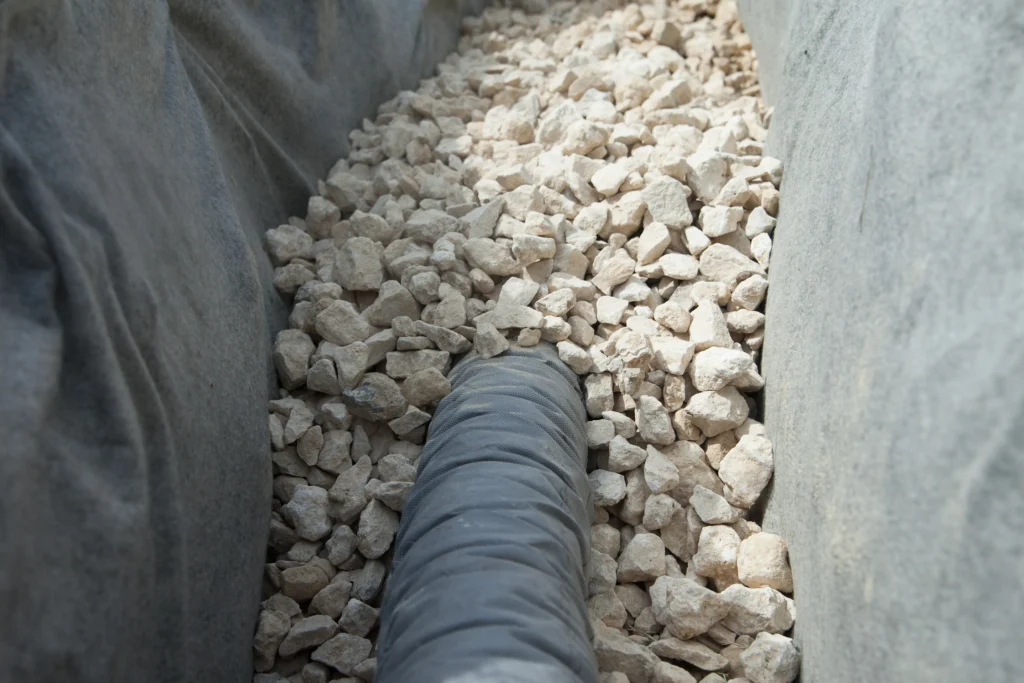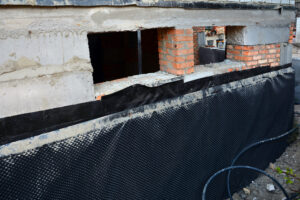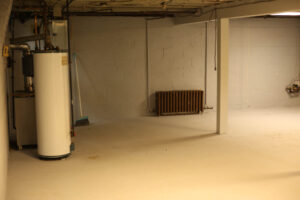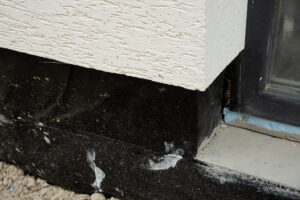In places that receive significantly higher amounts of rainfall, like New Jersey, flooding is always a serious menace.
While you may be tempted to ignore it once it happens around the yard, flooding can wreak havoc once it reaches your basement.
From increasing hydrostatic pressure, which weakens the building foundation, mold and mildew, foundation wood rot, and respiratory diseases caused by high humidity levels, basement flooding is not one of those aspects that should be overlooked.
In the middle of all this, one perfect solution exists: French drains.
The system simply contains two components: crushed gravel and a perforated PVC pipe.

French Drain System
The perforated PVC pipe is laid in the center of crushed gravel where it picks up basement water before redirecting it to a dry well or a sump pump that further takes it away from the building.
Gravel is used to filter the water of any earth materials, preventing soil erosion. The perforations can be either holes or slits, based on your drainage needs, soil type, and scope of drainage it is expected to handle.
This article aims to debunk the mysterious functioning of these unsung heroes of home protection in New Jersey.
Water Table and Flooding
The topography of the majority of New Jersey comprises low altitude areas, which are vulnerable to flooding during rainy seasons. Adding to its susceptibility to flooding given its proximity to the coastline implies the water table is usually a bit higher. These combined, make up for the reasons New Jersey is often faced with frequent flooding during heavy downpours or snowmelt. It therefore implies that without proper drainage features, even the basements are at risk of flooding.
Setting up French drains takes up downpours and groundwater, impeding accumulation, which has adverse effects on the foundation. The drainage feature collects ground and rainwater, channeling it toward a drainage field or a sump pump, keeping basements dry even during heavy downpours or flooding events.
Basement Water Issues
New Jersey’s poor soil drainage, coastal storms especially in the Southern regions, fluctuating water levels, and raised water table contribute to water infiltration in basements. As clay soils expand and push against foundation walls, they cause cracks, where ground and rainwater seep through into basements. Here, the water is responsible for mold formation, allergies, wood rot that compromises structural integrity, and paint warping and peeling. These systems are often set up along the basement perimeter, or just below the foundation level. They collect water seeping through the walls or rising from the ground and guide it into a sump pump, or far from the structure. This system protects basements from water-related damage and keeps them dry and usable year-round.
Soil Types
The majority of New Jersey, especially in the Northern regions, is covered with clay soils. Clay soil is known for its impermeability, meaning it does not, or allows very little water to filter down through the ground. The soil can result in water pooling around the foundation upon getting saturated. The onset of saturation and eventual water pooling causes two main problems that New Jersey homeowners have to struggle with: surface water pooling and pressure on foundation walls. Over saturation of clay soils results in basement floor pooling, hence the name wet basement. In addition, when saturated, clay soil expands and pushes against foundation walls, causing them to crack or shift.
The systems help by creating an artificial channel for water to drain far from the foundation, preventing it from pooling in the surrounding soil and relieving the pressure on the foundation.
Foundation Protection
Water pooling around the foundation is detrimental to the structural wellbeing. The constant moisture can weaken the structural materials through wood rot, over time. Saturated clay soils cause cracks on foundation walls when they expand, push, shift, or settle. French drains from a preventative protocol that helps protect a foundation through various ways. Water draining far from the foundation it ensures the foundation and under basement soils remain stable and dry, reducing the dangers of cracks or foundation shift. It also prevents the risk of damage to structural materials from sustained moisture levels. French drains offer homeowners an additional protection layer by handling the excess rainwater that faulty gutters, downspouts, and other systems might miss.
By managing groundwater and runoff, the system plays a critical role in protecting homes in New Jersey from water related challenges. Whether struggling with coastal storms, heavy downpours, or seasonal snowmelt, these systems help maintain dry basements, solid foundations, and long-term structural integrity.



